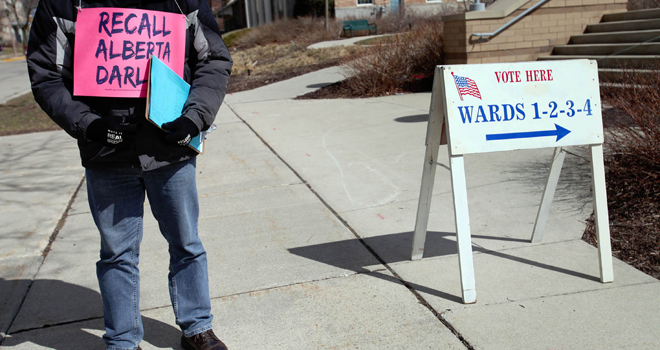Wisconsin Democrats have easily fended off a Republican ploy in the state Senate recalls, with the official Dem candidates in each of six races easily defeating Republican activists who also filed in the Democratic primaries. But Republicans have not failed to reap some advantages from the situation.
With the vast majority of the precincts now in, all six official Democrats have been projected as the winners by the Associated Press. Only one primary, for the 10th District (GOP Sen. Sheila Harsdorf), has turned out to be tight or seriously contested, with official Dem candidate Shelly Moore winning by a margin of 54%-46%.
The other Dem primaries are nowhere near that close: Nancy Nusbaum is winning the primary for the 2nd District (Sen. Robert Cowles) by 65%-35%; Sandy Pasch is winning the 8th District (Sen. Alberta Darling) by 67%-33%; Fred Clark is winning the 14th District (Sen. Luther Olsen) by 67%-33%; Jessica King is winning the 18th District (Sen. Randy Hopper) by 68%-32%; and Jennifer Shilling is winning the 32nd District (Sen. Dan Kapanke) by 70%-30%.
Soon after the recall elections were triggered, Republicans declared a strategy to plant fake candidates in the Democratic primaries — which they have called “protest candidates” — in order to delay the general elections from July to August, while the GOP incumbents ran unopposed. The candidates included a GOP activist in his 20s, and an octogenarian former GOP state representative, among others. As it turned out, the scheme would cost local governments throughout the state over $400,000.
Predictably, this led to some low-level dirty tricks and mischief-making, with conservatives being urged to vote in the Democratic primaries for the fake Dems. Despite the possibility of countering this, Democrats specifically rejected entreaties by labor to respond in kind and run fake Republicans, in order to keep Republican voters in their own primaries.
However, Republicans gained an advantage from this maneuver that was about more than just the primaries themselves: By delaying the general elections to August, they bought themselves more time to quickly vote on various policies — including a redistricting maneuver for 2012, which will involve a suspension of the state’s usual redistricting procedures in order to move up the process. Of course, there is nothing too unusual about a gerrymander when a party has won full control of the legislature — but the expediting of the normal rules, in order to beat the clock on a wave of recalls, does add to just how peculiar this whole year has been for Wisconsin.









